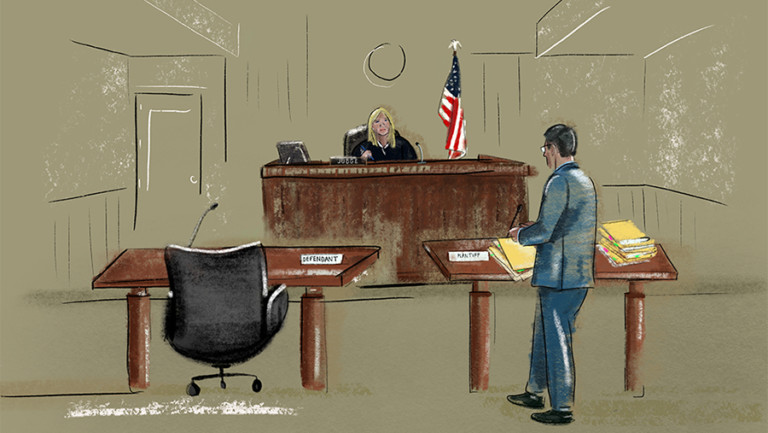By Ashlee Highland, CARPLS Supervising Attorney

You would be shocked at how quickly you, without your knowledge, can have all the money in your bank account frozen after a judgment in debt court. As a legal aid attorney in the Chicago area for over 20 years, I’ve seen countless examples of the ways debt courts are rigged against low-income people.
The Pew Charitable Trust’s release this week of a report on the state of debt courts demonstrates the ways in which corporate debt collectors are at an unfair advantage in court.
As a result of the coronavirus pandemic and the economic turmoil it has wrought, countless more people will face consumer debt collection efforts as a result of rising expenses and falling incomes.
With the courts closed due to the COVID-19 pandemic, there must be a reexamination of the great vulnerability people in crushing debt face. They are unable to pay for basic needs, rent checks bounce, cards are declined at the grocery store, and other regular bills cannot be paid. Gov. JB Pritzker and the Illinois Supreme Court have responded with limited protective measures for debtors during this unprecedented crisis, but there is more to the story.
In Illinois, under normal circumstances, the debtor is allowed to “unfreeze” their account by asserting a “wildcard exemption” in court of up to $4,000. Usually, it can take several weeks before there is a court date available on the bank freeze. Many debtors are unaware of how to exercise their rights. According to the Pew Report, debt lawsuits frequently end in default judgment, or without consideration of the facts, indicating that many people do not respond when sued for a debt. Most people who are dealing with a debt lawsuit in the U.S. have no representation, and we see that mirrored in our clients at CARPLS.

Even when a client can file an emergency motion, for many it means missing two days of work—one day to prepare and file the motion, and one to have it heard. And consumers who find themselves paying high interest rates on default judgments can face an even deeper cycle of debt (Pew Report, p. 17).
During the pandemic, Gov. Pritzker issued Executive Order 2020-25 that temporarily suspends some wage garnishments. This was a good first step, but the executive order did not address outstanding bank freezes set before the pandemic or anticipate the impact of the courts being closed.
Take the example of a single mother I counseled recently. Her bank account was frozen along with her tax refund at the end of February. In late March, she contacted us after she lost her job due to COVID-19 and was worried that her stimulus check would also be frozen when it was electronically deposited. Until the courts could reopen, the suburban courthouse where her hearing was to take place was on indefinite hold. Despite the collection company’s willingness to dismiss the bank citation, the bank could not release the funds without a court order. Through a CARPLS referral, my client accessed her funds after two months when the legal aid organization contacted the creditor and the bank to get the funds released. She is just one of many examples of bank freezes and was lucky to have the money released, eventually.
Illinois has been working to address the disparity in consumer laws regarding debtors over the last several years. The State passed legislation in 2019 that cuts the interest rate in half on consumer judgments under $25,000. Then, in response to the pandemic, a coalition of consumer legal aid, private attorneys, and the creditor’s bar, appealed to the Illinois Supreme Court regarding the injustice of allowing bank freezes to continue while appeals in court could not.

In response, the Illinois Supreme Court issued an order on April 24, limiting freezes on personal bank accounts until the courts reopen. Specifically, it automatically dismissed the existing bank freezes if the account had under $4,000, and would release the funds with a continued hearing if it had more than $4,000. We were thrilled to make progress, but this does not solve the underlying issue that debtors need immediate access to their funds to pay for their necessities, rent, utilities, and medical care.
When a judgment includes a bank freeze, debtors must be allowed to access at least $4,000 at all times until a hearing can be set. The rights of debtor’s to determine which property is protected by these exemptions must also be strengthened through statute. This change would go far to prevent the financial chaos and extreme hardship that often accompany a bank freeze. We also need to do a better job reporting this data. The Pew Report indicates that Idaho, Illinois, Mississippi, New Mexico, and Oklahoma did not report civil court data in 2017, and this needs to change.
The loss of income threatens to undermine Illinoisans’ financial and housing security and overall stability. It is imperative to protect stimulus checks and income at this crucial time. We have made good headway, and we have more to do.

